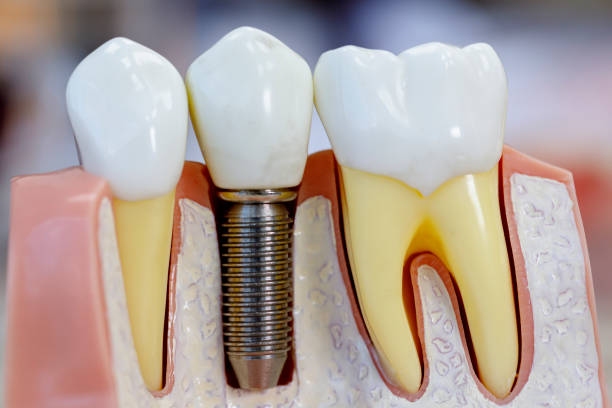Got Problem with Insufficient Bone Density? Try Subperiosteal Dental Implants!
Are you missing teeth and looking for a suitable replacement option? Subperiosteal dental implants may just be the solution for you! These unique implants offer numerous advantages, but also come with certain risks.
What Makes Subperiosteal Dental Implants Unique?
Subperiosteal dental implants offer a tooth replacement solution that involves placing the implant beneath the gum tissue and either on or above the jawbone. This type of implant is designed to securely anchor an artificial tooth, allowing for a comfortable and effective restoration of your smile.
Unlike traditional dental implants that are placed directly into the jawbone, subperiosteal implants rest on top of it. This makes them unique in several ways:
- These implants are suitable for patients who have low bone density in their jaw and cannot support traditional implants.
- The process is less intrusive and has a quicker healing period in contrast to conventional implants.
- Subperiosteal dental implants can be used for single or multiple tooth replacements, making them a versatile option.
What are the Advantages?
As mentioned, subperiosteal dental implants offer several advantages compared to traditional implants. These include:
- Suitable for patients with low bone density: Conventional dental implants rely on a specific amount of density in the jawbone for success. However, subperiosteal implants can be positioned above the bone, making them a suitable option for individuals who have suffered bone loss.
- Shorter recovery time: Since the procedure is less invasive, the recovery time for subperiosteal implants is shorter compared to traditional implants. This means less discomfort and downtime for patients.
- Versatility: Subperiosteal implants can be used to replace single or multiple missing teeth, making them a versatile solution for different dental needs.
- Easy maintenance: Just like natural teeth, subperiosteal implants can be brushed and flossed like normal. This makes them easier to maintain compared to other tooth replacement options.
- Long-term success rates: Subperiosteal implants have a high success rate, with many studies showing a 5-year survival rate of over 90%. This makes them a reliable long-term solution for missing teeth.
Are There Any Risks?
As with any medical procedure, subperiosteal dental implants come with potential risks that need to be considered. Here are some of the common risks associated with these types of implants:
- Infection: There can be a risk of infection at the implant site. As with any surgery, there is a risk of infection at the implant site. However, this can be minimized by proper care and following post-operative instructions.
- Nerve damage: During the placement of subperiosteal implants, it’s important to be aware that a slight risk of nerve damage may be present. In some cases, you may experience some tingling sensations or numbness, but these usually resolve over time.
- Implant failure: While subperiosteal implants have a high success rate, there is still a small chance of implant failure. This can be caused by factors such as poor oral hygiene or smoking.
Frequently Asked Questions
- What is the cost of subperiosteal dental implants?
The cost of subperiosteal implants can vary depending on the complexity of the procedure and the materials used. It is best to consult with your dentist for an accurate estimate.
- Are there any age restrictions for getting subperiosteal implants?
No, there are no age restrictions. As long as a person has healthy gums and sufficient bone structure, they can be a candidate for subperiosteal implants.
- How long does the procedure take?
The placement of subperiosteal implants typically takes 1-2 hours. However, there may be additional appointments for follow-up and adjustments.
- Will I be able to eat normally with subperiosteal implants?
Yes, once the implants have fully healed and integrated with the jawbone, you should be able to eat a variety of foods without any restrictions.
- Can subperiosteal implants be used for multiple missing teeth?
Yes, subperiosteal implants can be customized to replace multiple missing teeth in a row, making them an effective solution for those who are not candidates for traditional dental implants.
With their customizable design, high success rate, and minimal discomfort during placement, subperiosteal implants are a great choice for those looking to restore their smile and oral function.
If you are interested in learning more about subperiosteal implants or finding out if you are a candidate, consult with our dentist today at Illume Dental for more information.
